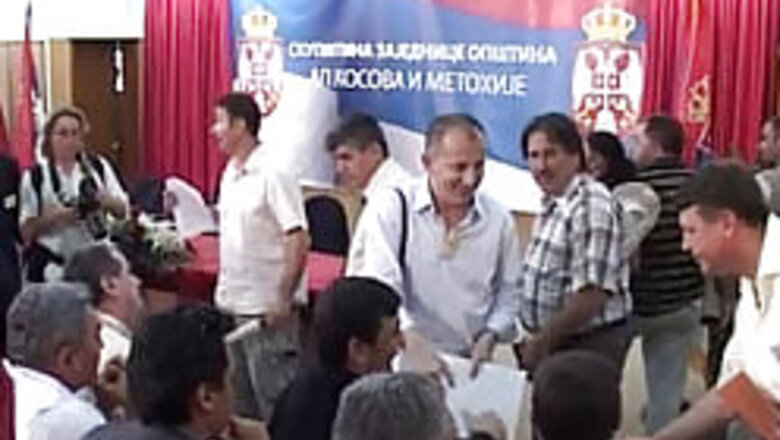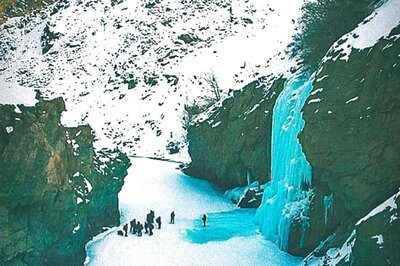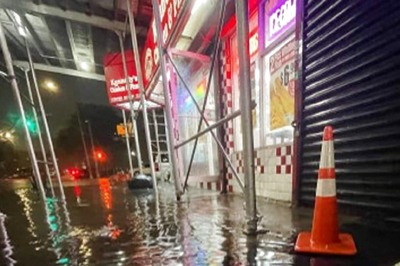
views
Mitrovica, Kosovo: Kosovo's hardline Serb leaders formed their own parliament on Saturday, ignoring Kosovo's declaration of independence and defying its United Nations administrators.
The action in the Serb-controlled half of the divided town of Mitrovica represents an attempt by the Serbs to split the disputed territory, which they claim as their own despite the Kosovo Albanian majority's Western-backed secession in February.
The assembly consists of 45 Serb representatives elected in Serb local elections in Kosovo, held in May. Serbs control about 15 percent of Kosovo's territory in the southeastern corner of Europe.
''The assembly is the foundation of the Serb protection of Kosovo,'' said Marko Jaksic, one of the hardline Serb leaders. ''We will not allow the formation of another Albanian state in this part of Europe.''
A declaration adopted by the self-proclaimed parliament said that Kosovo is ''an inseparable part of Serbia,'' that Kosovo Serbs would abide by the Serbian laws and its constitution and that Kosovo's secession was an illegal act.
Kosovo's President Fatmir Sejdiu has said that the Kosovo Serb leaders are trying to destabilize the new country by creating a separate assembly. He said the self-proclaimed parliament is part of their ''illegal structures.''
Creation of the new assembly is likely to inrease tensions between the Kosovo Albanians, 90 percent of Kosovo's 2 million people and the Serb minority. Their rivalry has brought the fledgling state to the verge of partition.
Although briskly brushed aside by politicians on both sides of the divide, the idea of partitioning Kosovo has been floated since the territory became a U.N. protectorate after NATO stopped a violent Serb crackdown against separatist Kosovo Albanians in 1999.
The United States and other Western nations formally rejected the idea due to fears it could encourage separatism in neighboring Macedonia and Bosnia.
''This parliament is empowered by the fact that no one has an idea how to challenge it,'' said Kosovo Albanian political analyst Ilir Dugolli. ''The risk of partition is becoming more real because conditions on the ground will make it more difficult to untangle it.''
The plan that made Kosovo independent offered the Serbs their own municipality in the north, coupled with extensive rights to lure them into accepting the new state.
But Serbs reacted angrily to the declaration of independence; they wiped out border controls between Kosovo and Serbia, boycotted the local police force and paralyzed the UN-run system in the north.
Although NATO-led peacekeepers patrol the area, the alliance has said it will not be dragged into policing the region, which effectively leaves the territory under Serb control.
If partition were agreed by Belgrade and the Kosovo government in Pristina, it could resolve the dispute between Kosovo and Serbia and remove an obstacle on both countries' path toward membership in the European Union. But it is very unlikely leaders on either side would agree.
The Serb representatives met as they marked Vidovdan, or St. Vitus Day, the anniversary of the 1389 battle in which a Christian army led by Serbian Prince Lazar was defeated in Kosovo by invading forces of the Muslim Ottoman Turks.
The battle came to symbolize Serbs' historic resolve not to give up Kosovo, the heartland of their statehood and religion.
Kosovo police strengthened security and diverted traffic from Serb enclaves throughout Kosovo to prevent clashes with ethnic Albanians as Serb pilgrims visited the site of the battle.
The Belgrade government representative at the inaugural assembly session, Slobodan Samardzic, welcomed the formation of the body.
''I am convinced that this assembly will help that Kosovo remains a part of Serbia, as it has always been,'' the outgoing nationalist Serbian minister for Kosovo said.
Kosovo declared independence from Serbia in February, and has won recognition from the US and most EU nations. Serbia and Russia have declared the move illegal. Kosovo's constitution came into force on June 15, granting broad autonomy to the Serb minority in Kosovo.




















Comments
0 comment